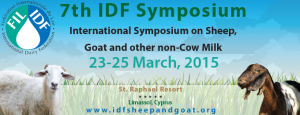Conferences
7th IDF International Symposium on Sheep, Goat and other Non-Cow Milk
23-25 March 2015, Limassol Cyprus
Over 130 experts from 16 countries gathered in Limassol, Cyprus this week for the International Dairy Federation’s IDF 7th International Symposium on Sheep, Goat and other non-Cow Milk to discuss the latest developments in goat, sheep and other non-cow milk sectors.
Speakers presented state-of-the-art research on a wide range of topics including husbandry and milk production, technology, chemistry, physics, microbiology and nutrition. They also highlighted innovation in technology for dairy products processing or nutritional aspects of non-cow milk.
Session I covered the Policies, Economics and Social aspects of sheep/goat milk production. Prof G Giraud highlighted the value added of sheep/goat milk products and how the price is affected when milk products gain Protected Designation of Origin PDO) / Protected Geographical Indication (PGI) status. The importance of precise dairy sheep farming for maximizing production was also highlighted as well as quality parameters of milk (i.e. Somatic Cell Counts). Data were shown regarding the Cyprus sheep/goat milk sector and an overview of the emerging sector of donkey milk production in the Mediterranean was also presented.
Session II focused on milk constituents and indigenous microflora that could have a beneficial health impact to human nutrition, although it seems that we have ways in bridging the gap between the milk technology and the actual impact on human health.
Session’s III Keynote Speaker Dr K. Papadimitriou gave a detailed insight on how genomic analysis of bacteria isolated from milk or milk products could give evidence for safe use of lactic acid bacteria as possible starter cultures. The use of analytical techniques on protein analysis and biomarkers for the authentication of high mountain products were also demonstrated.
During Session IV of the Symposium, keynote Speakers (T.Huppertz, B.Malmgren), demonstrated the need for innovative technologies to produce long-life products from non-cow milk, particularly because of the unique composition of these milks (i.e. camel, buffalo or donkey).
During the final Session, the primary production systems of sheep/goat milk were thoroughly presented while the importance of the animal diet, different breeds, in-breeding, cross-breeding was highlighted for milk quality and milk yield.
“It was a great pleasure to welcome international experts during this Symposium. “The feedback on the speakers, and on the general organization has been excellent,” said Dr Photis Papademas, chair of the Organizing and Scientific Committees. “The feedback on the social aspects of the Symposia was also very positive, and it was great delegates were able to enjoy a taste of the Cyprus life while presenting or learning from others research,” he added.
For more information please visit the following website:
http://www.idfsheepandgoat.org




